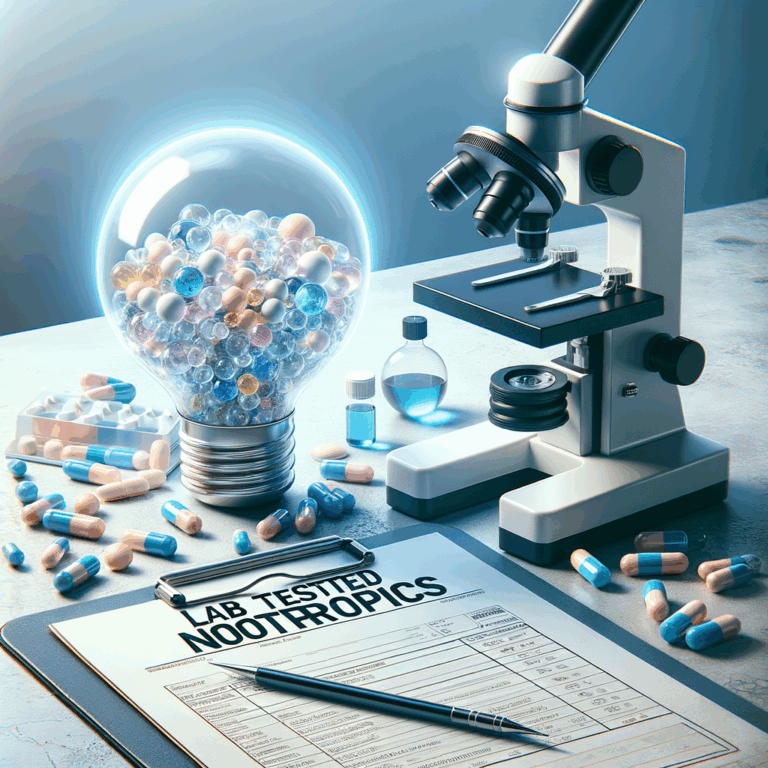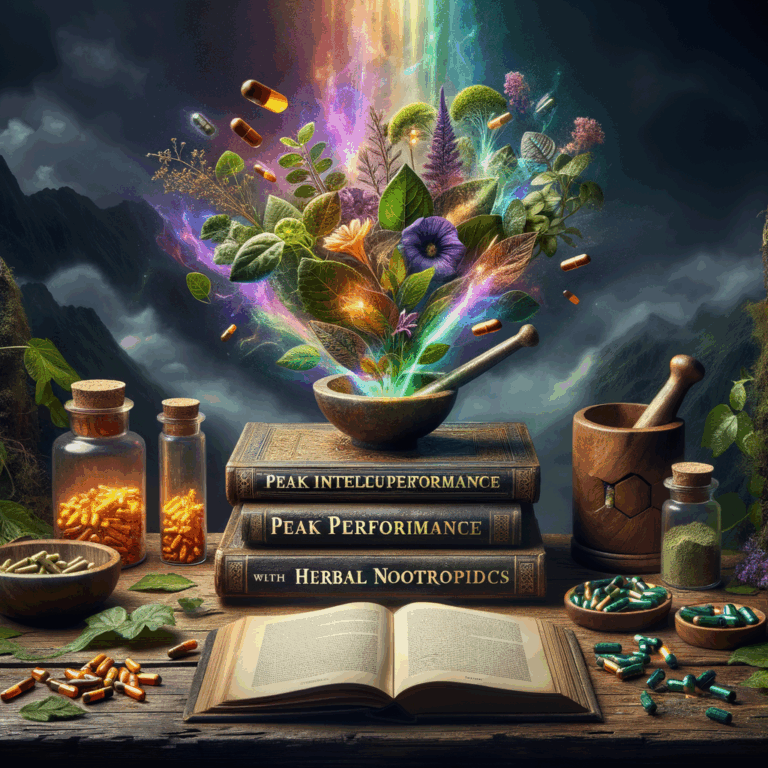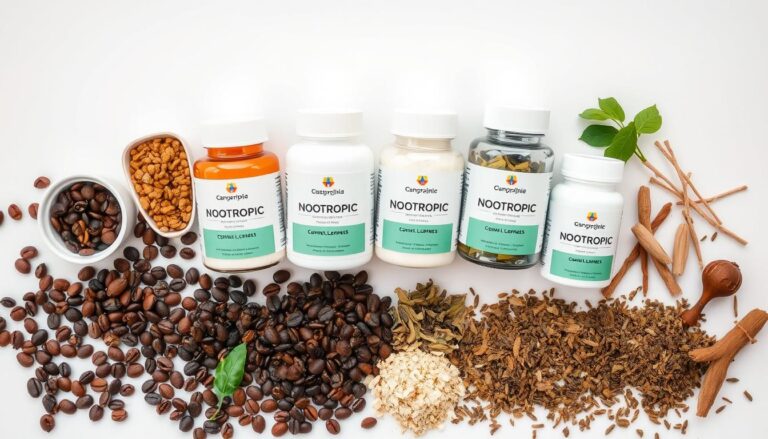- Understanding Focus Nootropics
- The Science Behind Nootropics
- Types of Focus Nootropics
- Benefits of Using Focus Nootropics
- Popular Focus Nootropics and Their Effects
- 1. Caffeine
- 2. L-Theanine
- 3. Bacopa Monnieri
- 4. Rhodiola Rosea
- 5. Omega-3 Fatty Acids
- How to Safely Use Focus Nootropics
- Potential Side Effects of Focus Nootropics
- Creating a Balanced Nootropic Stack
- Lifestyle Changes for Better Focus
- Finding the Right Focus Nootropic for You
- FAQs About Focus Nootropics
- 1. What are focus nootropics?
- 2. Are nootropics safe to use?
- 3. How long does it take to see results?
- 4. Can I take multiple nootropics together?
- 5. Do nootropics have side effects?
- 6. Can I get nootropics naturally?
- 7. How do I know what dosage to take?
- 8. Are there any drug interactions I should be aware of?
- 9. Can children use nootropics?
- 10. Do nootropics work for everyone?
- Conclusion
- References
Understanding Focus Nootropics
In today’s fast-paced world, our ability to concentrate and retain information can feel challenged. Whether you’re a student, a professional, or a busy parent, maintaining focus is essential. This is where focus nootropics come into play. These substances help enhance cognitive functions such as memory, creativity, and motivation.
Focus nootropics can play a crucial role in boosting mental performance. They come in various forms, from natural supplements to synthetic compounds. The best part is that they can help you achieve your cognitive goals without the crashes associated with caffeine or other stimulants.
The Science Behind Nootropics
Nootropics are substances that support cognitive enhancement. They can improve memory, decrease anxiety, and even elevate mood. Scientifically, nootropics influence neurotransmitters, which are the chemicals that transmit signals in the brain. By enhancing the connectivity of neurons, nootropics can lead to improved focus and clarity.
Research shows that some nootropics can increase blood flow to the brain. This increased blood flow improves oxygen and nutrient delivery to brain cells. Better nourished brain cells function more efficiently, leading to sharper focus and memory retention.
Types of Focus Nootropics
1. Natural Nootropics: These come from plant extracts and are often considered safer. Common examples include caffeine, ginkgo biloba, and Rhodiola rosea. They provide sustained energy without the jitters.
2. Synthetic Nootropics: These are man-made compounds designed to enhance cognitive abilities. Popular examples include racetams like piracetam and aniracetam. While they may offer stronger effects, they often require careful use.
3. Nutraceuticals: These are food-based supplements containing vitamins, minerals, and other nutrients. Omega-3 fatty acids and B-complex vitamins fall into this category. They provide the brain with essential nutrients for optimal performance.
Benefits of Using Focus Nootropics
Focus nootropics offer a wide array of benefits. First, they can significantly enhance your memory. Many users report increased retention and recall after using these compounds. This can be especially helpful during exams or important presentations.
Second, they boost concentration levels. With distractions looming everywhere, focusing on a single task can be challenging. Nootropics help filter out distractions, allowing you to concentrate better on your work.
Lastly, they help in reducing brain fog. A foggy mind can impede your productivity. Nootropics improve mental clarity, giving you the sharpness you need to tackle your daily challenges.
Popular Focus Nootropics and Their Effects
1. Caffeine
Caffeine is one of the most widely used nootropics. It stimulates the central nervous system, leading to increased alertness. Users often experience enhanced mental clarity and improved energy levels.
Pros:
– Easily accessible
– Quick effects
– Improved mood
Cons:
– Possible jitters
– Increased heart rate
2. L-Theanine
L-Theanine is an amino acid found in green tea. It promotes relaxation without causing drowsiness. Many people pair L-Theanine with caffeine to balance its stimulating effects.
Pros:
– Reduces stress
– Enhances focus
– Promotes relaxation
Cons:
– Effects vary by individual
3. Bacopa Monnieri
Bacopa Monnieri is an herbal supplement traditionally used in Ayurvedic medicine. Studies show it can improve memory and cognitive processing. Regular intake can lead to significant improvements over time.
Pros:
– Long-term memory enhancement
– Reduces anxiety
Cons:
– May take time to see effects
4. Rhodiola Rosea
Rhodiola is an adaptogen, helping the body adapt to stress. It improves focus and reduces fatigue. This herb is well-regarded for its mental and physical health benefits.
Pros:
– Reduces mental fatigue
– Enhances mood
Cons:
– May cause digestive issues in some
5. Omega-3 Fatty Acids
Found in fish oil, Omega-3s are essential for brain health. They support synaptic function, which plays a role in memory and learning.
Pros:
– Supports overall brain health
– Reduces inflammation
Cons:
– May not be suitable for vegans
How to Safely Use Focus Nootropics
When considering focus nootropics, safety is paramount. Start with low doses to assess your tolerance. Each individual reacts differently; what works for one person may not work for another.
It’s also essential to research the nootropics you plan to use. Some may interact with medications, so consulting a healthcare professional is wise. Create a regimen that includes breaks to avoid building a tolerance to the effects.
Potential Side Effects of Focus Nootropics
While many people experience positive effects, some individuals may encounter side effects. Caffeine, for instance, can induce restlessness or anxiety in high doses. Similarly, too much Bacopa Monnieri may lead to digestive discomfort.
Be mindful of the dosages and make adjustments as needed. Keep a journal to track your experiences and any adverse effects. This habit can help you fine-tune your nootropic intake and get the most benefit.
Creating a Balanced Nootropic Stack
A nootropic stack is a combination of different nootropics taken together to enhance cognitive function. The goal is to maximize benefits while minimizing side effects. Here’s a sample stack for enhanced focus:
| Nootropic | Dosage | Purpose |
|——————|————————|——————————————|
| Caffeine | 100-200 mg | Energy and alertness |
| L-Theanine | 200 mg | Calm focus |
| Bacopa Monnieri | 300-600 mg (daily) | Long-term memory improvement |
| Rhodiola Rosea | 200-400 mg | Stress reduction and mood improvement |
Always remember to consult with a healthcare professional when creating your stack. Individual needs and tolerance levels can vary significantly.
Lifestyle Changes for Better Focus
While nootropics can boost your cognitive function, lifestyle changes can maximize their effectiveness. Here are some strategies to consider:
1. Stay Hydrated: Dehydration can lead to fatigue and decreased concentration. Aim for at least eight glasses of water daily.
2. Regular Exercise: Physical activity increases blood flow to the brain. It also releases endorphins, helping to reduce stress.
3. Mindful Eating: Incorporate brain-boosting foods like fruits, vegetables, and whole grains. Avoid heavily processed foods that can lead to brain fog.
4. Adequate Sleep: Sleep is crucial for cognitive performance. Aim for 7-9 hours of quality sleep each night.
5. Manage Stress: Incorporating techniques such as meditation or yoga can improve focus and mental clarity.
Finding the Right Focus Nootropic for You
Choosing the right focus nootropic can be overwhelming due to the plethora of options available. Start by identifying your primary goals. Are you looking to improve memory retention, enhance concentration, or reduce anxiety? Understanding your needs will guide your choices.
After identifying your goal, do thorough research on potential nootropics. Look for reputable brands with positive reviews. Keep in mind that individual responses vary, so be prepared to experiment a bit to find the ideal one for you.
FAQs About Focus Nootropics
1. What are focus nootropics?
Focus nootropics are substances that enhance cognitive functions like memory and concentration.
2. Are nootropics safe to use?
Most nootropics are considered safe when used correctly, but it’s essential to consult a healthcare professional first.
3. How long does it take to see results?
Results can vary, but some users report improvements within a few hours, while others may take weeks for full benefits.
4. Can I take multiple nootropics together?
Yes, many people create stacks of different nootropics to enhance their effects. However, always do thorough research and consult a professional.
5. Do nootropics have side effects?
Yes, some nootropics can cause side effects. Caffeine may lead to jitteriness, while others might cause digestive issues.
6. Can I get nootropics naturally?
Yes, some natural sources include caffeine, omega-3 fatty acids, and herbs like Bacopa Monnieri and Rhodiola Rosea.
7. How do I know what dosage to take?
Start with low doses to assess your tolerance. Research the recommended dosages for any specific nootropic.
8. Are there any drug interactions I should be aware of?
Definitely. Many nootropics can interact with medications, so always consult with a healthcare professional before starting a new supplement.
9. Can children use nootropics?
Children should not take nootropics unless under the guidance of a healthcare professional.
10. Do nootropics work for everyone?
No, individual responses can vary greatly. What works for one person may not work for another.
Conclusion
Focus nootropics offer promising solutions for anyone looking to enhance their cognitive abilities. They provide a unique way to improve memory, concentration, and mental clarity. However, it’s essential to use them safely and responsibly. Pairing nootropics with a healthy lifestyle can yield even better results.
To get the most out of focus nootropics, pay attention to your body’s responses. Assess your goals, and choose wisely. With the right nootropics and a bit of patience, you can elevate your cognitive performance and tackle life’s challenges with renewed vigor.
References
1. Healthline: What Are Nootropics?
2. WebMD: Nootropics
3. Scientific Research: The Effects of Nootropics on Cognitive Function



